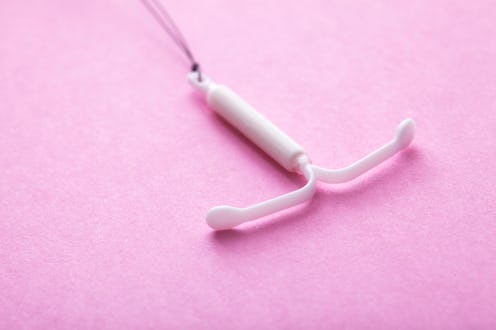Life
9 People Explain Their IUD Experience In One Sentence

When it comes to contraceptive options, intra-uterine devices (IUDs) are less popular than other methods like the Pill; only 8% of U.S. women between 15 and 44 are using either an IUD or a contraceptive implant right now, according to the Centers for Disease Control & Prevention, as opposed to 15.9% who are on the Pill. Some health authorities have wondered why IUDs aren't more widely used. As people who've had them explain to Bustle, they can be painful to insert, sometimes have side effects, and aren't for everybody — but for people for whom IUDs work, this form of birth control can be game-changing.
If you're thinking about getting an IUD, there are multiple things to consider. There are two types of IUD, both of which require insertion into the uterus by a gynecologist: the hormonal IUD, which releases synthetic hormones to prevent pregnancy, and the copper IUD, which impedes the action of sperm. IUDs can last several years, and Planned Parenthood calls them one of the most effective birth control methods available, with less than one out of 100 users getting pregnant while they have one. Hormonal IUDs are also sometimes recommended as a treatment for endometriosis, a condition in which uterine tissue grows outside the uterus and sheds painfully every month.
Nine people share the one-sentence summary of their IUD experience with Bustle. Their stories show that there's not one universal response to IUD — not by a long shot.
1Rebecca, 33
"My IUD saved me from debilitating menorrhagia and anaemia, so I'd call it life changing."
2Meg, 32
"The first one I had for about 10 years, and it was completely fine, but the second time was awful — I was in unbearable pain, bled for two weeks out of every four, developed anemia and had to go on a course of iron supplements, so I had it removed and it was a revelation."
3Jenny, 32
"I had the copper IUD and it caused horrendous PMS, agonizing cramping and heavy bleeding, so I'm now on the Mirena [hormonal] IUD, and after months of random pains and cramping, things seem to have settled down; I have no periods, and although insertion/removal was extremely upsetting and sore (I cried), I think overall this works out with less pain and better mental health."
4Claire, 35
"IUD number one was recommended to try to help me with my endometriosis issues, and it literally changed my life after decades of endometriosis symptoms, but IUD number two after childbirth shifted against my [uterine] wall and I'm still bleeding two months later; I'm hoping it will get better once it has settled in."
5Jen, 31
"It makes [my] periods more painful, but 10/10 would recommend for set-it-and-forget-it birth control."
6Cat, In Her 20s
"Most of the time I don't even remember I have it — insertion required painkillers and some deep breathing but now I haven't had period pain since 2012."
7Ava, 38
“Having an IUD was a physically and emotionally painful experience — I am also constantly shocked by the lack of long-term research on the secondary effects of hormonal birth control including IUDs.”
8Tina, 37
"My IUD was supposed to help my periods become lighter and more regular, but I now bleed twice a month on average and have developed large cysts on both my ovaries, so to say it’s worsened symptoms would be an understatement."
9Iman, 24
"Getting my IUD was incredibly painful, but I love it — it takes away half the anxiety I used to have surrounding birth control and sex, and when I'm ready to have kids, I can take out my Mirena and immediately start trying."
10
IUDs can be a game-changer, but they can also have unexpected side effects or react poorly with your physiology. If you're considering an IUD, talk to your health provider or gynecologist in-depth about your options and whether it's the right option for you.